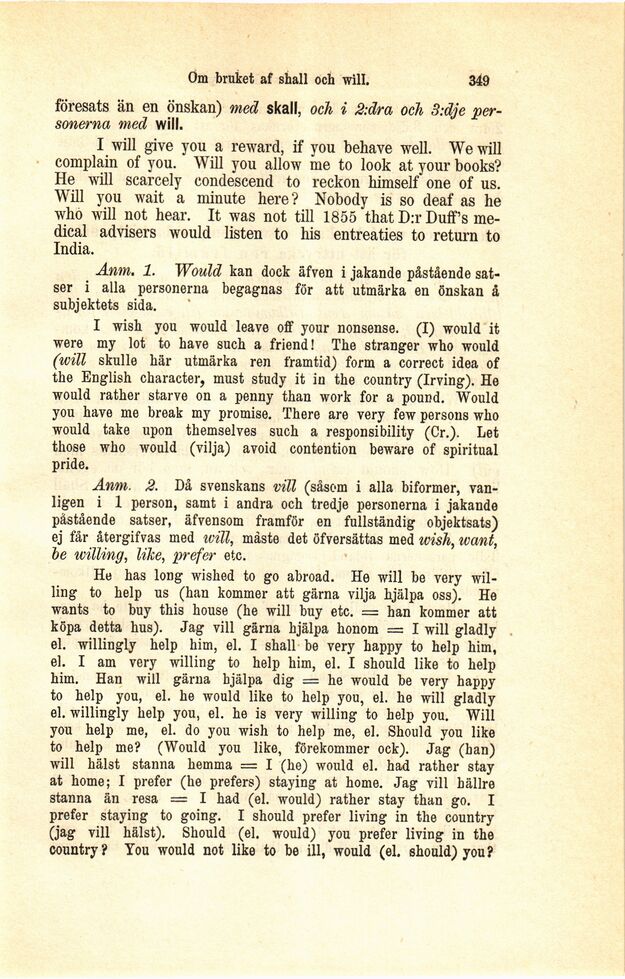
Full resolution (JPEG) - On this page / på denna sida - Häfte 10 - Om bruket af de engelska hjälpverben shall och will (G. S. Löwenhielm)

<< prev. page << föreg. sida << >> nästa sida >> next page >>
Below is the raw OCR text
from the above scanned image.
Do you see an error? Proofread the page now!
Här nedan syns maskintolkade texten från faksimilbilden ovan.
Ser du något fel? Korrekturläs sidan nu!
This page has never been proofread. / Denna sida har aldrig korrekturlästs.
Om bruket af b hall och will.
349
föresats än en önskan) med skall, och i 2:dra och 3:dje
personerna med will.
I will give you a reward, if you behave well. Wewill
complain of you. Will you allow me to look at your books?
He will scarcely eondescend to reckon bimself one of us.
Will you wait a minute here? Nobody is so deaf as he
who will not hear. It was not till 1855 that D:r Duff’s
me-dical advisers would listen to his entreaties to return to
India.
Anm. 1. Would kan dock äfven i jakande påstående
satser i alla personerna begagnas för att utmärka en önskan å
subjektets sida.
I wish you would leave off your nonsense. (I) would it
were my lot to have such a friend! The stranger who would
(will skulle här utmärka ren framtid) form a correct idea of
the English character, must study it in the country (Irving). He
would rather starve ön a penny than work for a pound. Would
you have me break my promise. There are very few persons who
would take upon themselves such a responsibility (Cr.). Let
those who would (vilja) avoid contention beware of spiritual
pride.
Anm. 2. Då svenskans vill (såsom i alla biformer,
vanligen i 1 person, samt i andra och tredje personerna i jakande
påstående satser, äfvensom framför en fullständig objektsats)
ej får återgifvas med ivill, måste det öfversättas med wish, want,
be tvilling, like, prefer etc.
He has long wished to go abroad. He will be very
wil-ling to help us (han kommer att gärna vilja hjälpa oss). He
wants to buy this house (he will buy etc. = han kommer att
köpa detta hus). Jag vill gärna hjälpa honom = I will gladly
el. willingly help him, el. I shall be very happy to help him,
el. I am very willing to help him, el. I should like to help
him. Han will gärna hjälpa dig = he would be very happy
to help you, el. he would like to help you, el. he will gladly
el. willingly help you, el. he is very willing to help you. Will
you help me, el. do you wish to help me, el. Should you like
to help me? (Would you like, förekommer ock). Jag (ban)
will hälst stanna hemma = I (he) would el. had rather stay
at home; I prefer (he prefers) staying at home. Jag vill hällre
stanna än resa = I had (el. would) rather stay than go. I
prefer staying to going. I should prefer living in the country
(jag vill hälst). Should (el. would) you prefer living in the
country? You would not like to be ill, would (el. should) you?
<< prev. page << föreg. sida << >> nästa sida >> next page >>